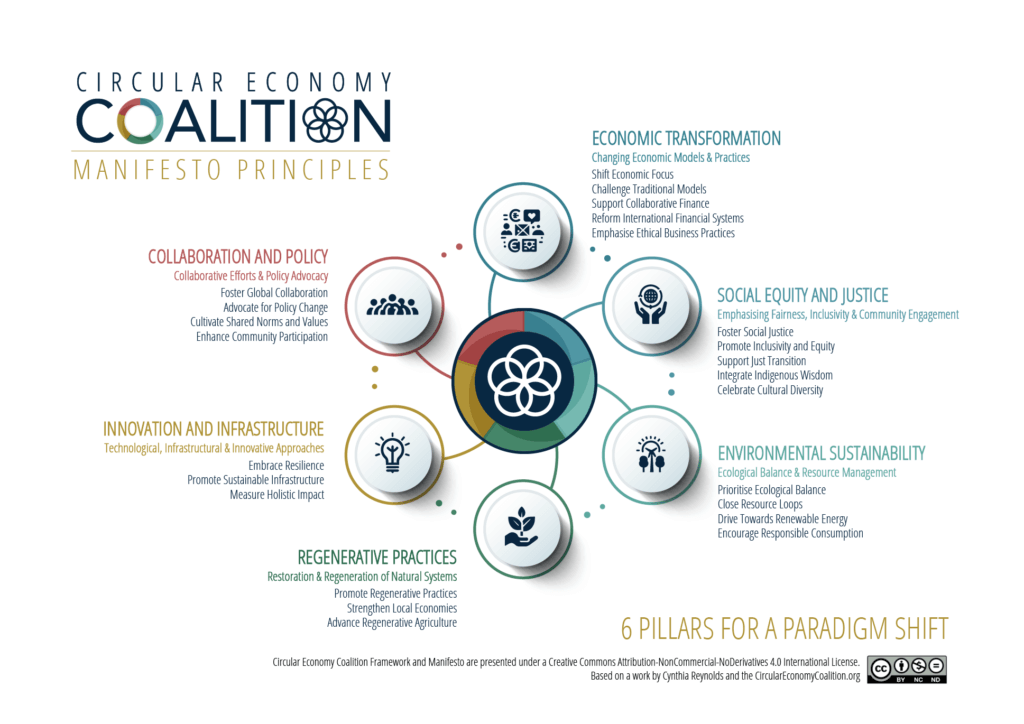6 Pillars for a Paradigm Shift
24 Principles to guide the way

MANIFESTO INTRODUCTION
In a world grappling with the consequences of unsustainable practices, the #Circularity4All Manifesto emerges as a transformative blueprint. Drawing inspiration from the Circular Economy Coalition’s mission, this manifesto is a commitment to fostering inclusive and socially just circular economic regions. It embodies an adaptive system of production and consumption that places ecological balance, social justice, and resilience at its heart.
The manifesto recognises the interconnectedness of global and local challenges, advocating for solutions that are inclusive, equitable, and sustainable. It champions restorative practices that aim to close the loop of resource use, ensuring that nothing is wasted and that the benefits of these practices are equitably shared among all stakeholders. This approach is a departure from neoclassical, growth dependent economic models, as it gives equal importance to environmental sustainability, social equity, and economic viability, ensuring the harmonious coexistence of all living things within the planet’s ecological boundaries.
The current state of our world, marked by economic rent seeking and extractive business models, where money is issued as interest bearing debt and GDP as the measure of progress, has led to significant social and economic inequalities. These inequalities have further exacerbated environmental degradation, loss of biodiversity, and the displacement of people and communities resulting in climate refugees. To remedy these pressing issues, the Circularity4All Manifesto calls for the implementation of policies and incentives that support a transition towards non-extractive economies supporting regenerative cultures.
Achieving this transition is more than an economic shift; it’s a call for a values based transformation that revitalises our relationship amongst and between humans and nature. It requires the adoption of new metrics and indicators that prioritise overall wellbeing and ensure a just transition for all within the limits set by our planet’s global commons and unequally distributed resources.
To realise this transformative change, the manifesto emphasises the need to cultivate shared norms and values that transcend cultural and linguistic barriers. It envisions inclusive circular economic regions that are socially just, necessitating effective multilateral solutions that bridge and unite stakeholders in both the Global North and South.
6 Pillars for a Paradigm Shift - 24 Principles to Guide the Way - Circularity4All Manifesto
PILLAR 1 – Economic Transformation:
Principles related to changing economic models and practices.
- Shift Economic Focus: Move away from GDP-centric measures towards metrics that value wellbeing, environmental health, and social equity.
- Challenge Traditional Models: Question and innovate beyond extractive growth dependent economic models to prioritise generative and restorative contributions.
- Support Collaborative Finance: Support financial innovation that is inclusive, non-extractive and contributing to economic resilience.
- Reform International Financial Systems: Champion the overhaul of global financial mechanisms to ensure rapid, inclusive economic growth in low-income countries, focusing on wellbeing and equitable access to resources in the transition towards circular economies.
- Emphasise Ethical Business Practices: Encourage businesses to operate with transparency and a focus on social and environmental responsibility.
PILLAR 2 – Social Equity and Justice:
Principles emphasising fairness, inclusivity, and community engagement.
- Foster Social Justice: Ensure that circular economy initiatives address social inequalities and provide equitable opportunities for all.
- Promote Inclusivity and Equity: Advocate for circular economic solutions that are accessible and beneficial to diverse communities globally.
- Support Just Transition: Guide industries and communities towards sustainable practices, ensuring that the transition is fair and inclusive.
- Integrate Indigenous Wisdom: Respect and incorporate traditional and indigenous knowledge in developing sustainable practices.
- Celebrate Cultural Diversity: Recognize and value the diversity of cultures, knowledge systems and sustainable circular practices.
PILLAR 3 – Environmental Sustainability:
Principles focused on ecological balance and resource management.
- Prioritise Ecological Balance: Champion sustainable practices that maintain the planet’s ecological boundaries and promote biodiversity.
- Close Resource Loops: Implement circular practices ensuring the reuse, recycling, and regeneration of resources, minimising waste.
- Drive Towards Renewable Energy: Shift from fossil fuels to renewable energy sources to reduce human contribution to accelerating climate change.
- Encourage Responsible Consumption: Advocate for the maintenance, use and consumption of resources that is mindful of environmental impact and social responsibility.
PILLAR 4 – Regenerative Practices:
Principles focused on restoration and regeneration of natural systems.
- Promote Regenerative Practices: Encourage practices that restore and rejuvenate natural systems and resources.
- Strengthen Local Economies: Support local and regional economies with sustainable circular business practices.
- Advance Regenerative Agriculture: Advocate for agricultural practices that support soil health, biodiversity, and sustainable resource use.
PILLAR 5 – Innovation and Infrastructure:
Principles focused on technological, infrastructural, and innovative approaches.
- Embrace Resilience: Develop systems and practices that are adaptable to environmental, social, and economic changes.
- Promote Sustainable Infrastructure: Support the development of infrastructure and technology that aligns with circular economy principles.
- Measure Holistic Impact: Develop comprehensive indicators to assess the environmental, social, and economic impacts of policies and practices.
PILLAR 6 – Collaboration and Policy:
Principles centred on collaborative efforts and policy advocacy.
- Foster Global Collaboration: Encourage cooperative efforts between the Global North and South for shared sustainability goals.
- Advocate for Policy Change: Lobby for governmental policies that support circular economic models and practices.
- Cultivate Shared Norms and Values: Integrate circular principles into curricula at all levels to foster and promote regenerative values, breaking down cultural and linguistic barriers.
- Enhance Community Participation: Encourage active community involvement in developing and implementing local circular solutions, providing the knowledge and skills needed to participate effectively.
Guided by a common vision, Circularity4All aspires to maintain and utilise resources according to their highest societal value, rather than their highest commercial value. This paradigm shift is crucial for a future where people and the environment thrive in harmony. The Circularity4All manifesto is not just a document; it is a roadmap to a future where humans can still exist.
